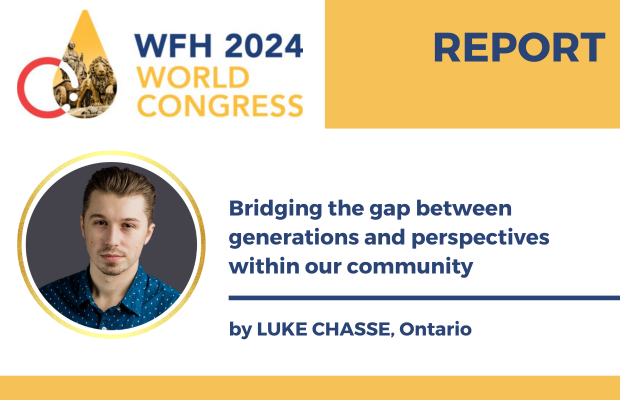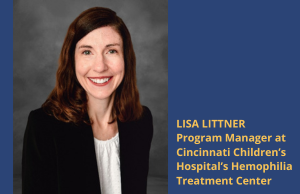Bridging the gap between generations and perspectives within our community

As a youth delegate representing Canada at the WFH 2024 World Congress, I found myself among experienced professionals, leaders of national hemophilia chapters, health care providers and pharmaceutical representatives. Sponsored by the CHS Karttik Shah Youth Fellowship , I quickly realized the importance of being a youth representative amongst those older than myself who have faced significantly greater challenges living with hemophilia than I have.
Over the course of the three days, I attended a variety of sessions exploring different facets of hemophilia care. From discussions on pain management and ageing with bleeding disorders to examining the benefits and risks of novel therapies like emicizumab and upcoming bispecific antibody treatments, each session offered valuable insights into our community’s challenges and advancements.
 One particularly eye-opening session, The challenges of longevity, focused on the lack of health literacy found throughout the world and how even in Canada, 60% of us are not health literate (Health literacy, speaker: Lisa Littner, MPH, MSW, LISW-S, CHES – Cincinnati Children’s Hospital Medical Center). Health literacy plays a crucial role in empowering individuals, especially young individuals transitioning from pediatric clinics to adult care, to make informed decisions about their health by understanding medical information and effectively navigating healthcare systems. As the Camp Program Coordinator at Hemophilia Ontario, I work very closely with youth and see the importance of equipping them with the necessary health literacy skills to ensure they can successfully navigate their healthcare journey and advocate for their own well-being.
One particularly eye-opening session, The challenges of longevity, focused on the lack of health literacy found throughout the world and how even in Canada, 60% of us are not health literate (Health literacy, speaker: Lisa Littner, MPH, MSW, LISW-S, CHES – Cincinnati Children’s Hospital Medical Center). Health literacy plays a crucial role in empowering individuals, especially young individuals transitioning from pediatric clinics to adult care, to make informed decisions about their health by understanding medical information and effectively navigating healthcare systems. As the Camp Program Coordinator at Hemophilia Ontario, I work very closely with youth and see the importance of equipping them with the necessary health literacy skills to ensure they can successfully navigate their healthcare journey and advocate for their own well-being.
As I absorbed the information from these sessions, I couldn’t help but notice the visible reminders of the struggles endured by many older individuals living with hemophilia. Their walking with a limp, stiff joints and canes, served as poignant reminders of the progress we’ve made in hemophilia care. Coming from Canada, where access to healthcare is robust, witnessing these reminders reinforced the importance of initiatives like the CHS Karttik Shah Youth Fellowship, which empower youth affected by bleeding disorders like me to understand how we got here and how we can further shape the future of hemophilia care. I look forward to the CHS sending more youth to events like these to inspire and inform generations beyond mine of the work that has been done to support and improve their well-being, and to create more voices in our community.
In conclusion, my experience at the WFH 2024 World Congress went beyond just attending sessions or networking; it was about bridging the gap between generations and perspectives within our community. As I return home, I carry with me a renewed sense of purpose and a commitment to continue advocating for advancements that will shape the future of bleeding disorder care.
I am immensely thankful to the Canadian Hemophilia Society for providing me with this invaluable opportunity and to their Karttik Shah Youth Fellowship program for believing in the importance of our youth to drive positive change within our community.
NOTE FROM THE CHS: Luke is the 2024 recipient of the CHS Karttik Shah Youth Fellowship. This fellowship was initiated in memory of Karttik Shah of Toronto, Ontario, in recognition of his commitment to hemophilia youth programming in Canada and abroad. In order to promote the development of its future leaders, the CHS offers this fellowship to enable Canadian youth who are committed to long-term involvement in the CHS to attend the World Federation of Hemophilia World Congresses.




